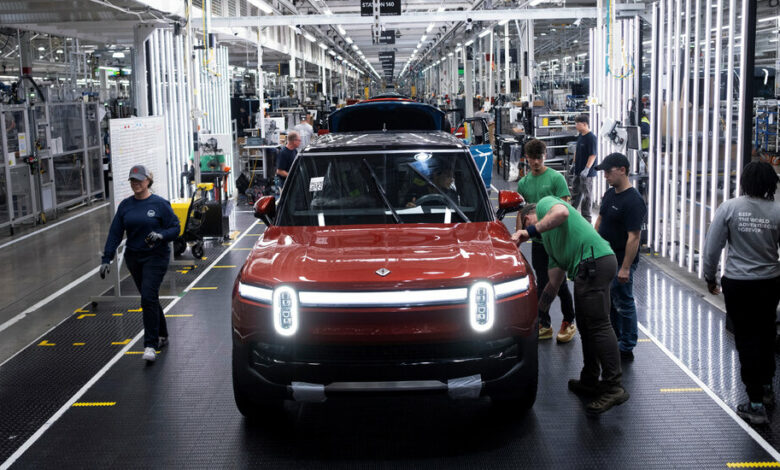Volkswagen invests up to $5 billion in Rivian

German automaker Volkswagen said Tuesday it will invest up to $5 billion in Rivian, an electric truck maker that has struggled to make a profit, and said the companies will collaborate on software for electric vehicles.
The deal creates an unusual alliance between the world’s second-largest automaker and an electric vehicle start-up. This startup has done everything in its power to meet investor expectations that the company would achieve the success that has made Tesla the most valuable automaker in the world.
If successful, the partnership would address both companies’ weaknesses. It would give Volkswagen the software expertise that auto analysts say it sorely lacks. And Rivian, in addition to cash, would benefit from the manufacturing expertise of an automaker that produces nearly 10 million vehicles a year, putting it just behind Toyota Motor in the global auto industry.
Volkswagen said it would initially invest $1 billion in Rivian, increasing that over time to as much as $5 billion. If regulators approve the transaction, Volkswagen could become a significant shareholder. The infusion represents a major vote of confidence in Rivian, which loses tens of thousands of dollars on every vehicle it sells.
Rivian’s pickups and SUVs have received rave reviews in the automotive press, but the company has struggled to ramp up production at its Normal, Illinois, plant. In recent months, many investors have become concerned that the company may not survive long enough to become profitable.
RJ Scaringe, Rivian’s founder and CEO, said the Volkswagen cash would help Rivian launch a midsize SUV called the R2, which will retail for about $45,000, and complete a manufacturing plant in Georgia. Rivian halted construction of the Georgia plant in March in an effort to save more than $2 billion.
“This is important to us financially,” Mr. Scaringe said of the partnership with Volkswagen during a telephone news conference on Tuesday.
The cheapest vehicle Rivian currently sells, the R1T pickup, starts at about $70,000, a price that limits its sales to affluent early adopters. The R1S SUV starts at $75,000. Even at those prices, Rivian lost $39,000 for every vehicle it sold in the first three months of the year.
Rivian shares rose more than 50 percent in extended trading Tuesday after the deal was announced.
The electric vehicle market is divided between relatively young companies like Tesla and Rivian, which make exclusively battery-powered cars, and established automakers like Volkswagen, General Motors and Toyota, which often struggle to get to grips with new technology.
Other than Tesla, none of the newer American automakers specializing in electric vehicles have gained significant market share. Some, such as Fisker and Lordstown Motors, have ceased production and filed for bankruptcy protection.
Auto analysts have long viewed Rivian as one of the electric vehicle startups most likely to survive, in part because it has raised billions of dollars in investment. Amazon is one of the largest shareholders and the main customer of the company’s delivery vehicles.
But Volkswagen and Rivian operate very differently, and it could be a challenge for them to work together. Volkswagen, based in Wolfsburg, Germany, is known for its rigid, top-down management and is partly owned by the state of Lower Saxony. Based in Irvine, California, Rivian has the more free-spirited culture of a tech startup. Rivian said in April that it expected to sell 57,000 vehicles this year, far fewer than Volkswagen sells in a week.
According to Scaringe and Volkswagen CEO Oliver Blume, the deal blossomed after the two met at a Porsche customer center and connected over their love of cars.
“We have a very similar mindset,” Mr. Blume said during the conference call.
Ford Motor was a major shareholder in Rivian for a time, and the two companies once talked about building SUVs together. But that plan never came to fruition, and Ford sold most of its Rivian stake. Ford and Volkswagen have a separate partnership that involves joint development and production of electric vehicles.
The Volkswagen-Rivian alliance could encourage other established automakers to consider investments or partnerships that pair them with start-ups like Lucid Motors — companies that have well-regarded technology but are loss-making and struggling to establish themselves in a crowded market. Another major automaker, Stellantis, the parent company of Chrysler, Fiat and Peugeot, has invested in a Chinese company, Leapmotor, for access to its electric car technology.
Vehicles using the software developed by the new joint venture will come to market in the second half of this decade, Volkswagen said. Any Volkswagen brand, including Audi and Porsche, could use the technology, Mr. Blume said. Scout, the American off-road brand that Volkswagen is reviving at a factory under construction in South Carolina, could also use the software.
But Volkswagen and Rivian will continue to market their vehicles separately.




